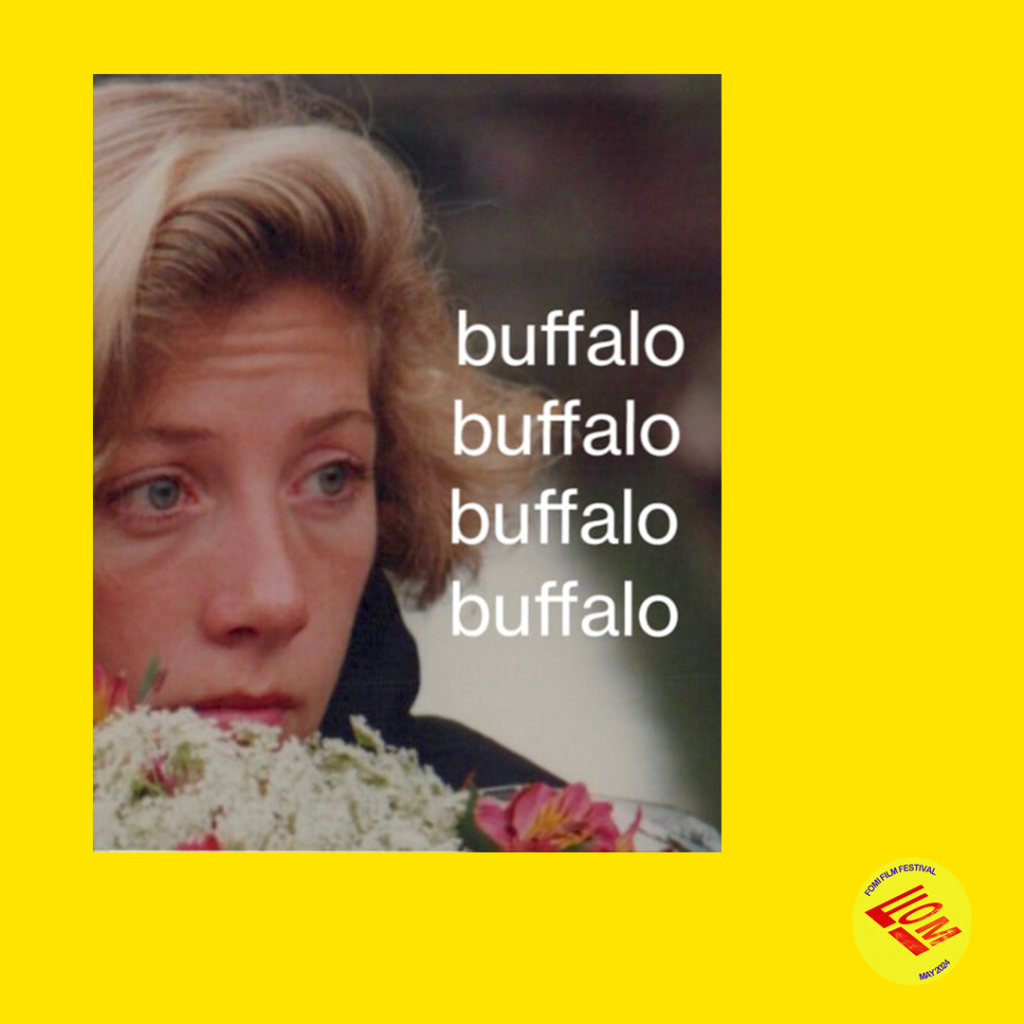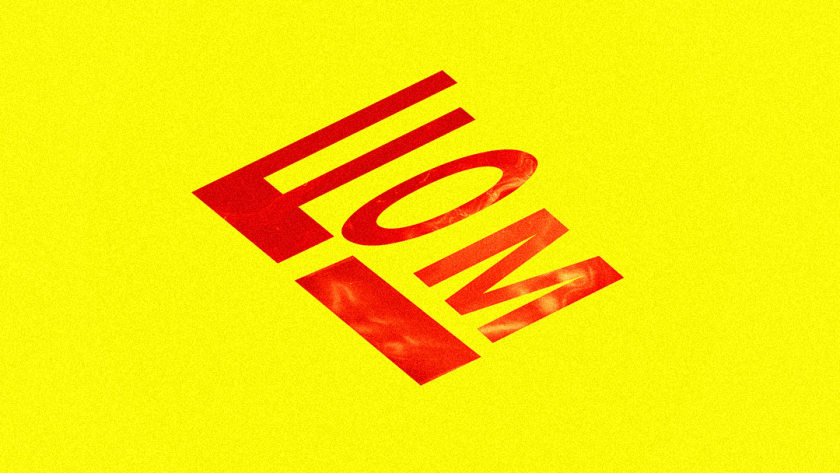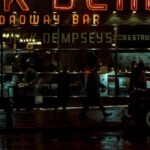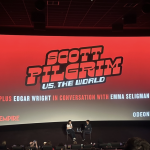The Festival of the Moving Image (FOMI) is set to captivate audiences once again this year. Ahead of the 2024 festival’s launch on May 20th, Yiwen Hu sat down with co-directors Aryan and Müge, and media officer Tony, to discuss the ethos of this year’s festival—Reflections. In this interview, they share their visions for the event, the intricate behind-the-scenes processes, and what attendees can look forward to. Join us as we explore the creative minds driving one of UCL’s most anticipated cultural events.
Please give us an introduction about yourself and your roles & responsibilities in the committee.
Aryan: My name’s Aryan. I am a third-year Anthropology student, and I’m currently one of the two festival co-directors for FOMI this year. As a festival co-director, my responsibilities include overseeing the whole committee, ensuring the departments working in coordination with one another, as well as determining the overall structure and thematic focus of festival.
Müge: My name is Müge. I’m also one of the two co-directors for FOMI. I’m a part-time Master’s student in Creative Health, and I also work in the community of mental health. As a co-director, as Aryan said, we decided on the ethos of the festival. We reviewed previous editions to identify what we could bring to the festival this year. Additionally, we organized the festival’s structure and oversaw all necessary actions and tasks.
Tony: I’m Tony. I’m a third-year Comparative Literature student, and I’ve been working as part of our general outreach team as the press officer. Specifically, my role involves coordinating the festival coverage with various outlets both on campus, like the Film Society Journal and Pi Media, as well as outlets from other universities and across London. I would say that the work I’ve been doing has been part of a broader team effort to reach out to individuals and groups for whom FOMI is a new concept. In the past two years, the focus has primarily been within UCL, particularly within a specific niche where many people are already familiar with the UCL Film Society or are part of the film network at UCL. This year, our real goal is to attract as many people as possible, especially those who may not be familiar with that world but are interested in seeing what the festival is about.
What inspires you in the first place to join the committee of the Festival of Movie Images?
Aryan: I would say that what inspired me was, in part, real-world experience. I have covered numerous film festivals, including Venice, Berlin, the London Film Festival, and the East Asian Film Festival, for the Film Society Journal. I’ve been inspired by how festivals like these can bring together a global film community under one umbrella. More importantly, I was struck by how these festivals can showcase moving image art that highlights very pertinent and pressing issues. For instance, this year, Venice, Cannes, and Berlin have all faced protests concerning Palestine or labour issues. As festival director, I believe I can help orient our festival to focus on issues relevant to students.
Müge: My inspiration came from attending FOMI in 2022. That edition was highly successful in bringing together talented student filmmakers and more established filmmakers under the same umbrella at the Bloomsbury Theatre. Having worked on term films that year and then seeing our film projected at the Bloomsbury Theatre, watching it with the cast, crew, and other students, was a magical experience. Since then, I’ve been pursuing film production. Organizing a film production made me realize that I wanted to take the opportunity to organize the film festival and create that space for all the students this year.
Tony: My past experiences with the festival were definitely the main reason I got involved. I participated in the past two editions. In 2022, I attended FOMI for the first time. That was also the first time FOMI returned after a hiatus. A bit of history: the festival was originally created in the late 2000s by UCL Film Society alumni who wanted a platform to showcase student work across the university. Like many student-led initiatives at UCL, it collapsed when COVID first happened and went into an extended hiatus. In 2022, the Film Society committee made an effort to bring it back, and it was really successful. There were fewer films from outside UCL that year, but it was a moment of joy to see people come together and appreciate each other’s work after such a long hiatus. I had the chance to watch a term film I acted in on the Bloomsbury Theatre screen, which was very rewarding. My goal is not to replicate that memory but to create an experience that is as interesting and fulfilling for this year’s audience, hopefully reaching a larger audience.
How has your course of study inspired you to participate in film-related activities, considering it differs significantly from the traditional BA in Media or Film pathway?
Aryan: I would say there’s not much of a delineation between my degree and film because I study anthropology. There’s a significant crossover between the history of film and anthropology; they are intertwined. For instance, filmmakers like John Rouch and Robert Flaherty created ethnographic films that influenced cinema and various filmmaking movements worldwide. One direct influence on my interest in film was taking courses like History and Ethics of Documentary, which led me to appreciate the kinds of films featured in FOMI. Additionally, anthropology’s self-reflexive critique requires examining your own positionality as a researcher. I believe filmmakers need to have that same awareness of their positionality.
Müge: As a budding filmmaker, I was always concerned that you needed to follow a certain pathway to get into film. However, my experience here at UCL has shown me that all it takes is passion. I did my undergraduate degree in psychology, and now I’m studying creative health. I’ve always been interested in how art can be used for well-being and how it can be about well-being as well.I have a holistic understanding of well-being, believing that any societal issue impacts our well-being. Using film as a medium to reflect on and showcase these experiences is a form of caring for well-being. Additionally, being part of a film project creates a sense of community, even if only for a few months. Overall, that’s what I love about film—the process and the final product both demonstrate how we can care for ourselves and each other.
Tony: Echoing that sentiment, I believe my degree aligns well with my involvement in events like FOMI. Comparative literature, true for many on my course, attracts those who are inherently curious about the arts and the world at large. It’s a field that inherently embraces uncertainty about one’s future path. Comparative literature, as a discipline, is quite flexible. In recent years, much of the literature in this field explores its own identity. My degree involves examining various art forms and establishing connections between literature and film, as well as other performance and artistic mediums. With FOMI, what stands out is the diversity across different mediums, genres, and visions. This diversity reflects the same spirit of curiosity that makes my degree compelling to me.
Can you provide a brief overview of the steps involved in transforming this film festival from a concept to a reality?
Aryan: Fundamentally, ethos is at the heart of any film festival’s formation. Take Cannes, for example; a significant aspect of the festival is its globalization, bringing together filmmakers from diverse cultures, disciplines, and backgrounds while honouring certain filmmakers. Similarly, our festival, FOMI, this year aims to highlight the theme of reflections. This encompasses reflections between the past and present, between the self and the observed, and between different modes of expression, outsiders, and insiders. This duality is crucial in filmmaking, not only between filmmakers and those in the film but also between filmmakers and the audience. By embracing this ethos as a fundamental tenet for FOMI this year, we’ve crafted a program that speaks to how students view and experience film—through experimentation and self-definition. Self-definition plays a significant role; hence, we’ve removed barriers present in previous years, such as allowing filmmakers to categorize their own films and provide self-definition statements when submitting films. This includes doing away with the category of an experimental film.
Müge: Adding onto that, I think it was crucial in our initial conceptions to ensure that our theme of reflections wasn’t merely talked about but also embodied in the form of the festival. It wouldn’t have felt right to discuss reflections without allowing the form to mirror that concept. We’re proud of accomplishing that. As for the practical process, after agreeing on our ethos, which thankfully happened swiftly as we were mostly aligned on wanting the festival to broadcast the issues filmmakers are discussing and working with, we assembled our crew. The talent pool was exceptional, making decision-making quite challenging. We aimed to apply the same malleability we value in our working processes to how the committee operated. Rather than rigid teams, we encouraged everyone to collaborate in whichever way suited them best. Subsequently, we focused on outreach, reaching out to judges, potential speakers, and engaging in wider outreach efforts, such as those led by Tony.
Tony: A significant part of the process, working alongside other team members like Kymie and Milla, has involved making judgment calls. Understanding the ethos of the festival, which our festival directors set the tone for, has been paramount. Once we grasp that, we determine which societies, press outlets, and individuals would best represent that ethos. Many of our meetings revolved around decisions like which publications to reach out to or which speakers to invite, ensuring their presence aligns with our festival’s vision. We compile a list of viable candidates and reach out to them, engaging in correspondence once we hear back, or gradually phasing out candidates who may not be available or suitable upon further discussion. Ultimately, it boils down to how well we comprehend the festival’s ethos and our efforts to apply it as best we can.
What’s the most challenging aspect in organising this year’s festival?
Aryan: I would say that, uniquely for this year’s festival, the most challenging aspect was communication. Specifically, it was more about external communication rather than internal communication. Operating simultaneously with Cannes presented various challenges. We weren’t in direct competition with Cannes, but we had to navigate dealings with different external parties who had commitments in various areas. Since Cannes is the largest non-student film festival globally, it influenced decisions regarding which filmmakers, judges, speakers, and films we could involve in our festival. Running a film festival involves more than just programming films for the audience. We also had to consider sponsors and festival partners. Choosing appropriate partners and establishing mutually beneficial relationships with them was crucial. For example, Letterboxd not only dedicated a reason count for official institutions like the BFI and the Toronto International Film Festival but also provided discount codes for pro and patron memberships for festival ticket holders. Hence, communication with external parties posed the main challenge for this year’s festival.
Müge: I agree with that, and I’ll talk a bit more about our internal challenges, which are typical of any student project. Our festival planning coincided with the exam season. As students, it is one of our strengths to manage multiple responsibilities, and at times, some responsibilities may take precedence over others, which is entirely understandable. Hence, we’ve had to be innovative with our deadlines and problem-solving approaches. Despite these challenges, everyone has demonstrated resilience and perseverance in managing their various responsibilities. It’s truly inspiring to witness the dedication and hard work each team member has contributed to the project, despite the obstacles we’ve faced, showing how passionate everyone is and how much strength we can put into projects like FOMI.
Tony: When it comes to our outreach efforts, as Arya mentioned, the timing of our festival is significant. Apart from major film industry events like Cannes, which attract thousands of journalists and industry figures, reaching out to prominent outlets or ambitious targets on our end can be challenging. Additionally, within UCL and the Arts UCL community, there’s a lot happening. Shortly after our festival, the Arts UCL awards take place, and various showcases, from musical theatre to drama, occur within the stage side community of UCL. These projects are exciting and involve many people. Thus, we’re capturing the attention of UCL students amid numerous other societies and cultural projects, all trying to achieve similar goals.
The main challenge lies in constructing a clear and understandable identity for FOMI. The advantage of the 2022 edition, amid the COVID context, was the different set of expectations for live events, making people more open to online components and video conferencing for speakers. Now, two years later, expectations have shifted. Similarly, as we aim to reach audiences beyond just UCL Film Society members, defining what the festival means to them poses a challenge. It’s easy to promote the festival to those with a film in it, but the challenge lies in understanding what appeal the festival holds for a regular UCL student who isn’t a Film Society member and may not attend many arts events at all. Trying to frame the festival as a look into the world of film through a student lens, while emphasizing that it’s not exclusively for students, has been the main challenge.
What is your vision for this year’s festival? Are there any specific takeaways you hope the audience will gain?
Aryan: I would say that the specific vision for this year’s festival, FOMI, was fundamentally rooted in the ethos of Reflections. What this meant was allowing students to have a greater say in the programming of the films we’re showcasing. This year, we aimed to focus on and build upon the talent already present within UCL. Reflections involves not only looking externally at retrospective trials and connecting with other parties in the film world but also focusing on the talent within UCL itself. As part of this vision, we introduced a new programming strand on the first day called “Portico Perspective,” which exclusively focuses on the work of current UCL students and alumni. Additionally, we strategically scheduled films such as The Handmaiden by Park Chan-wook, which is slotted between the Retrospection on the second day and Prospection strands on the third day. This film, a contemporary take on Sarah Waters’ “Fingersmith” by a Korean filmmaker, serves as a bridge between the past and the present, exploring cultural identity in a transcultural context. Many films in our program similarly navigate cultural identity, bridging personal and cinematic identities.
Müge: I believe our vision, echoing Tony’s explanation, aimed to make FOMI an introduction for those who may not typically consider themselves film enthusiasts or art lovers. We wanted to create an inclusive environment where everyone feels welcome. Our ticket pricing offers three days of access for £15, which is equivalent to the cost of a single cinema ticket. Instead of watching just one film, the audience can watch numerous short films and retrospective screenings, exposing them to diverse perspectives and cultural trends. Although reaching out to audiences who may not typically engage with film has been challenging, it aligns with our vision. We aim to demonstrate that films are the reflections of filmmakers’ perspectives and cultural issues. This is why we chose the word “reflections”—to invite everyone to see themselves in the festival.
Tony: I hope that people who come to the festival would end up feeling more creatively inspired to make their own projects. One aspect of the festival that struck me profoundly was the realization that creating art is not as distant a possibility as it may sometimes seem. While it’s undoubtedly impressive to have your work showcased on a global stage like Cannes, there’s often an underlying pressure in the artistic community to produce work of that quality or not at all. However, over the past few years, particularly through my involvement with FOMI, I’ve come to understand that this mindset is far from reality. Looking at this year’s FOMI program, you’ll find a diverse range of films. Some are intricately crafted with the support of professionals and larger budgets, often produced within the context of film schools. Yet, alongside these, there are films made by UCL students outside of coursework or film society contexts—films created simply with a camera and a few friends. These films earn their place in the program due to the uniqueness of their ideas and the relevance of their themes. I hope that attendees recognize that even if their creations may not reach Cannes-level recognition, they are still meaningful contributions to the world of art. The first step in any artistic journey is simply to start creating.
Any recommendation or your personal favourite among all the films in the programme?
Aryan: I would say the film that I would recommend are the excellent retrospective screenings, because not only are we screening The Handmaiden, we’re also screening Jonathan Glazer, who won the Oscar from Prison Interest for screening his debut feature Sexy Beast on Sunday. Hence, I absolutely recommend seeing that fantastic film of my favourites. In the main festival program, I would also recommend coming to the opening ceremony to watch Pigeon-livered. In Portico Perspective, I would recommend seeing, especially in the time of political issues and the current encampment, From London to Gaza made by a UCL student. Beyond that, I will also recommend viewing and then taking away something from our new Prospection Strand, especially Crocodile by Dawid Bodzak, which was also featured in the Cannes Critics Week last year. If anyone coming to FOMI this year has been inspired by any film that they watch there, they may consider continuing with the festival next year, which creates the continuation of the festival cross time.

Müge: Buffalo buffalo Buffalo buffalo buffalo buffalo Buffalo buffalo is one of the films that the curators were really keen on showing.
Tony: In Portico Perspective, I would recommend My Cuppa Tea by Chaa who is an active member of the UCL Film Society. He works on many projects and collaborates frequently with those he met in the Film Society. As part of Campdale Motion collective partnered with the festival, one of their main filmmakers Diego also comes to the festival as a speaker and a judge. It’s almost an affirmation of what I said earlier about being able to find film-worthy subjects in the ordinary. It is also an affirmative reminder that creative partnerships starting from this university can lead to many fruitful places in the future.




